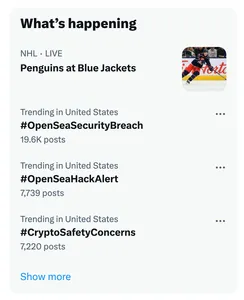Bittrex used to be a major player in the US cryptocurrency market, with over 20% of US market share in 2018. However, the exchange's dominance had dwindled to below 1% as of 2021.
Bittrex finally closes up for good
DOJ reportedly seeking $4 billion resolution to Binance investigation, with possible criminal charges against CEO
The negotiation may involve a deferred prosecution agreement, in which the US would file a criminal complaint but agree not to prosecute so long as Binance met agreed conditions under a monitoring process.
It remains to be seen if this is the avenue the DOJ and Binance will go with. A Bloomberg source speculated that a decision could come within the next few weeks.
Kraken sued by U.S. SEC
Furthermore, the SEC claims that Kraken commingled corporate and customer funds, "at times pa[ying] operational expenses directly from bank accounts that hold customer cash."
Kraken's new CEO, Dave Ripley, posted on Twitter that the company "plan[s] to vigorously defend [their] position" that they do not list securities.
DOJ cracks down on $225 million crypto romance scam
According to Tether, they "voluntarily fr[oze] approximately 225 million in USDT tokens" in connection to the investigation.
Some romance scammers hoping to lure victims into sending them cryptocurrencies are themselves victims of human trafficking operations, where they are held victim and forced to send such messages.
dYdX insurance fund loses $9 million in apparent attack
Kronos trading firm suffers key breach
Aqua web3 gaming marketplace shuts down
The company launched its marketplace in September 2022, backed by $10 million from the DIGITAL venture fund.
The Blockchain Group suspends stock trading in apparent financial crisis
The Blockchain Group is behind a number of different services, including a crypto wallet called Eniblock and an open source software bounty project called Bountysource. Users of the Bountysource project have been complaining about issues receiving payments since as far back as May 2023.
Network of fake Twitter accounts impersonating crypto security firms phish panicked victims
According to researcher zachxbt, who himself was one of the impersonated, the scammers have stolen more than $300,000 in various assets using this technique.
This is not the first time such a technique has been used — a scammer attempted a similar, though less successful, scheme in April 2022. Scams like this take advantage of the poor UX in the crypto world for tracking and revoking wallet permissions that have been granted, requiring people to use third-party websites created for this purpose. Some of them are legitimate, but there are many malicious copies of these revocation sites that prey upon users who may be acting quickly in fear that their assets are at risk.
Up to $1 billion stored in early Bitcoin wallets may be at risk due to "Randstorm" vulnerability
Unciphered worked with various wallet providers to contact people whose wallets may be vulnerable, though ultimately it is up to those wallet holders to secure their funds by creating new wallets and transferring their tokens. Unciphered also noted that some Dogecoin, Litecoin, and Zcash wallets may be vulnerable due to shared code.










